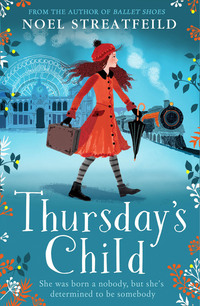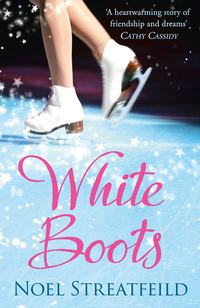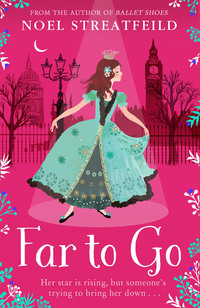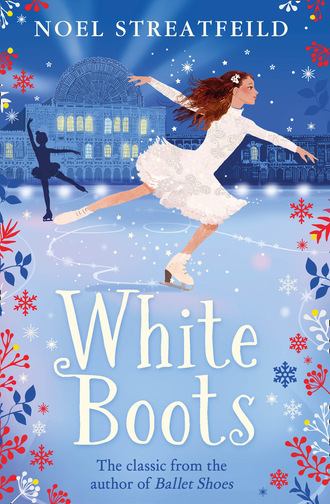
Полная версия
White Boots
Alec looked up from his doodling.
“What sort of needlework did you mean, Dad?”
George looked worried.
“Certainly not dusters and overalls. I seem to remember my grandmother doing some very charming things, fire-screens I believe they were.”
Olivia laughed.
“I’m not much of a needlewoman, and I can promise you even if I were to start today it would be two years before you would have even one fire-screen, so I think you can count the needlework department out.”
Alec put a bundle of newspapers under the arm of the figure he was doodling.
“It’s all right, Dad, I’m going to tide us over to start with by a newspaper round. Old Pulton wants somebody.”
Toby had been doing some figures on paper.
“If a newspaper boy is paid two shillings an hour, reckoning one hour in the morning and one hour in the evening daily for six days, with one hour on Sunday at double time, how long would it take him to earn second-hand boots and skates at a cost of five pounds?”
Alec said:
“If a boy and a half worked an hour and a half for a skate and a half…”
Olivia saw Toby felt fun was being made of a serious subject.
“I’m afraid,Toby, you’re going to grow up to be a financier, one of those people who goes in for big business with a capital ‘B’.”
Alec finished his drawing.
“It wouldn’t be a bad thing, we could do with some money in our family. If you were thinking, Toby, I might get Mr Pulton to advance five pounds for my services, it wouldn’t work because I might get ill or something and you’re too young to be allowed to do it.”
“That’s right, darling,” Olivia agreed. “It wouldn’t be practical anyway to buy boots because Harriet’s growing, and probably the moment Alec had bought her the boots they’d be too small. Feet grow terribly fast at her age, especially when you’ve been ill. I wonder if she’s awake?”
George got up.
“I’ll go and see. If she is I’ll bring her down. It’ll cheer her up to know what’s planned for her.”
Harriet was awake, and so was Edward. Edward was the good-looking one; his hair was not sandy like the rest of his family, but bright copper, his eyes were enormous with greenish lights in them. Strangers stopped to speak to Edward in the road just because they liked looking at him, and Edward took shameless pleasure in his popularity.
“It’s disgusting,” Alec often told him. “You’re a loathsome show-off.”
Edward was always quite unmoved, and merely tried to explain.
“I didn’t ask to be good-looking, but I like the things being good-looking gives me. I was the prince in the play at school.” Toby, when he heard that, had made noises as if he were being sick. “All right, make noises if you like, but I did like being the prince. There was special tea afterwards, for the actors, with ices.”
“But you can’t like people cooing and gurgling at you,” Toby always protested.
Edward seemed to consider the point.
“I don’t know. There’s you and Alec off to school and nobody knows you’ve been, and nobody cares. There’s me walks up the same street and everybody knows. I think it’s duller to be you.”
“It’s no good,” Alec would say to Toby, “wasting our breath on the little horror.”
“Just a born cad,” Toby would agree.
But Edward was neither a horror nor a cad, he was just of a very friendly disposition, a person who liked talking and being talked to. Already, although he had only been seven for one month, he had a good idea of the sort of people he liked talking to and the sort of people he did not. He was explaining this to Harriet when George came up to fetch her.
“It’s those silly sort of ladies with little dogs I don’t like, and people like bus conductors I do like.”
George went into Edward’s room.
“You’re supposed to be asleep, my son. Turn over and I’ll tuck you in. I’m taking Harriet downstairs.”
Edward sat up.
“What for? She’s supposed to be in bed and asleep too.”
George pushed Edward down.
“We’ve got something to tell her.” He could feel Edward rising up under his hand to protest that he would like to be told too. “Not tonight, old man, I dare say Harriet’ll tell you tomorrow.”
It was a cold night, so George not only made Harriet put on her dressing-gown but he rolled her up in an eiderdown and carried her down to the sitting room. Harriet was surprised to find herself downstairs. She looked round at her family with pleasure.
“Almost it’s worth being sent to bed with Edward to be got up again and brought downstairs. What did Dr Phillipson say?”
Olivia thought how terribly thin Harriet’s face looked, sticking out of a bulgy eiderdown. It made her speak very gently.
“He wants you to take up skating, darling.”
Nothing could have surprised Harriet more. She had been prepared to hear that she was to go for rides on the top of a bus, or do exercises every morning, but skating was something she had never thought about. George stroked her hair.
“Dr Phillipson is arranging for you to get in free.”
Alec said:
“So the only expense will be the hiring of your skates and boots, and that’s fixed.”
Toby looked hopefully at Harriet for some sign that she was working out the cost of skates and boots, but Harriet never worked out the cost of anything. She just accepted there were things you could afford and things you could not.
“When do I start?”
Olivia was thankful Harriet seemed pleased.
“Tomorrow, darling, probably, but you aren’t going alone, the doctor’s going to take you.”
Harriet tried to absorb this strange turn in her affairs. She knew absolutely nothing about skating; then suddenly a poster for an ice show swam into her mind. The poster had shown a girl in a ballet skirt skating on one foot, the other foot held high above her head, her arms outstretched. Thinking of this picture Harriet was as startled as if she had been told that tomorrow she would start to be a lion tamer. Could it be possible that she, sitting on her father’s knee rolled in an eiderdown, would tomorrow find herself standing on one leg with the foot of the other over her head? These thoughts brought her suddenly to more practical matters.
“What do I wear to skate, Mummy?”
Olivia mentally ran a distracted eye over Harriet’s wardrobe. She had grown so long in the leg since her illness. There was her school uniform, but that wanted letting down. There were her few frocks made at home. There was the winter party frock cut down from an old dinner dress which had been part of her trousseau. Dimly Olivia connected skating and dancing.
“I don’t know, darling, do you think the brown velvet?”
Harriet thought once more of the poster.
“It hasn’t got pants that match, and they would show.”
“She must match,” said Toby. “She’ll fall over a lot when she’s learning.”
Olivia got up.
“I must go and get our supper. I think tomorrow, darling, you must just wear your usual skirt and jersey; if you find that’s wrong we’ll manage something else by the next day.”
George stood up and shifted Harriet into a carrying position.
“Come up to bed, Miss Cecilia Colledge.”
Harriet’s skating ceased to be a serious subject and became funny. Olivia, halfway to the kitchen, turned to laugh.
“My blessed Harriet, what is Daddy calling you? It’s only for exercise, darling.”
Alec drew a picture of Harriet on his blotting paper: she was flat on her back with her legs in the air. Under it he wrote, “Miss Harriet Johnson, Skating Star.”
Toby gave Harriet’s pigtails a pull.
“Queen of the Ice, that’s what they’ll call you.”
George had a big rumbling laugh.
“Queen of the Ice! I like that. Queen of the Ice!”
Harriet wriggled.
“Don’t laugh, Daddy, it tickles.”
But when she got back to bed Harriet found that either the laughing or the thought of skating next day had done her good. Her legs were still cotton-woolish but not quite as cotton-woolish as they had been before her father had fetched her downstairs. Queen of the Ice! She giggled. The giggle turned into a gurgle. Harriet was asleep.
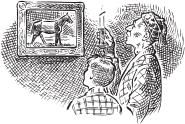
Chapter Two MR PULTON
ALEC CALLED ON Mr Pulton after supper. Mr Pulton had been born over the newspaper shop and so had his father before him, and likely enough rows of grandfathers before that. Nobody could imagine a time when Pulton’s newsagents had not been a landmark in the High Street. By luck, or because Pulton’s did not hold with meddling, the shop looked as if it had been there a long time. It was a little, low shop with a bow-fronted window, and there were the remains of some old bottle glass in one pane. Nobody knew Mr Pulton’s Christian name, he had always been just Mr Pulton to speak to, and C. Pulton when he signed his name. There was a lot of guessing as to what the C. stood for; local rumour had decided it was Carabas, like the marquess who was looked after by Puss in Boots. There were old men who were at school with Mr Pulton, who ought to have known his name, but they only remembered he had been called Pip Pulton. This was so unlikely a name for Mr C. Pulton that nobody believed the old men, and said they were getting on and had forgotten. It was true they were getting on, for anyone who had been at school with Mr Pulton was rising eighty.
Alec went to Mr Pulton’s back door for the shop was closed. He knocked loudly for Mr Pulton was a little deaf. After a moment there was a shuffling, grunting, wheezing sound, and Mr Pulton opened the door. He was a very thin, very pale man. His hair was white, and so was his face, which looked as if it had been a face for so long that the colour had been washed out of it, and it had been battered around until it creased and was full of wrinkles. His hands were pale too, long and thin and spidery; he wore clothes that nobody had ever seen anyone else wear; a little round brown velvet cap with a tassel hanging down on one side and a brown velvet coat and slippers embroidered with gold and silver thread. His paleness and thinness sticking out of the brown skull cap and brown velvet coat made him look like a delicate white moth, caught in a rough brown hand. There was, however, nothing delicate or mothlike about Mr Pulton’s mind; that was as quick and as tough as a lizard. This showed in his extraordinarily blue, interested, shrewd eyes. His voice was misleading for it matched his body and not his mind. It was a tired voice, which sounded as if it had been used such a lot that it was wearing away. Mr Pulton looked at Alec and his eyes showed he was remembering who he was, and anything that he knew about him.
“What can I do for you, young man?” Alec explained that he had come about the paper round. There was a long pause, not a pause of tiredness but a pause in which Alec could feel Mr Pulton was considering his paper round, and whether he was the sort of boy who could be trusted to deliver papers without bringing dishonour to Pulton’s Newsagents. Evidently his thoughts about Alec were nice, for suddenly he said a very surprising thing. “Come inside.”
Alec had never been inside Mr Pulton’s house before, and neither, as far as he knew, had anybody else. He had often wanted to go inside, because leaning across the counter waiting for his father’s paper he had sometimes seen glimpses of a back room, which seemed to be full of interesting things. Now he was inside the room and he found it even more interesting than he had thought it might be. It was a brownish kind of room, so evidently Mr Pulton was fond of brown. There were brownish curtains, and brownish chair covers, and brownish walls. There was a gay fire burning, but in spite of it the room was dark because Mr Pulton had not yet got around to electric light, and could not be bothered with lamps, so he lit his home with candles, which gave a queer, dim, flickering light. In spite of the dimness Alec could see the room was full of pictures, and the pictures were all of horses, which was amazing, for nobody had ever thought of Mr Pulton as being interested in horses. There were dozens of portraits of horses: race-horses, hunters, shire horses, almost every sort of horse. As well on the top of a bookcase, on brackets and on tables there were bronze models of horses. It seemed such a very horse sort of room that Alec thought it would not be rude to mention it.
“I say, what a lot of horses, sir.”
Mr Pulton picked up a candle. He walked slowly round his walls, his voice took on a proud, affectionate tone, though it still kept its frail, reed-like quality.
“Old Jenny, foaled a Grand National winner, she did. There he is, his portrait was painted the day after, so my father heard, you can see he was proud; look at him, knows he’s won the greatest test of horse and rider ever thought of. That’s Vinegar, beautiful grey, went to a circus, wonderfully matched greys they were. Now there’s a fine creature, you wouldn’t know what he was – Suffolk Punch. It takes all sorts to make up a horse’s world, just as it takes all sorts to make our world; Suffolk Punches are country folk, simple in their ways, not asking much nor wanting changes. Now there’s a smart fellow: Haute École they call that, see his feet? That’s fine work, that is, takes a clever horse for High School.” He paused by a bronze cast of a horse which was standing on a small table. He ran his hand over the back of the cast as if it were alive. “You were a grand horse, weren’t you, old fellow? My grandfather’s he was; used to hunt him, he did. My father used to say you were almost human, didn’t he? Whisky his name was; clever, couldn’t put a foot wrong. And how he loved it. Why, there’s mornings now, especially at this time of year, when there’s a nip of frost in the air, and the smell of dropped leaves, I can fancy old Whisky here raising his head, and I can see a look in his eye as if he were saying ‘What’s keeping us? Wonderful morning for a hunt, let’s be off.’”
Alec was so interested in the horses and the little bits of their history that Mr Pulton let drop, that he forgot the paper round, and it was quite a surprise to him when Mr Pulton, holding up his candle so that he could see Alec’s face clearly, said:
“Why do you want my paper round? Not the type.”
“Why not? I’m honest, sober and industrious.”
Mr Pulton chuckled.
“Maybe, but you haven’t answered my question. Why do you want my paper round?”
Alec, though privately he thought Mr Pulton was a bit inquisitive, decided he had better explain.
“Well, sir, it’s to hire boots and skates for my sister Harriet, who’s been ill and…”
Mr Pulton held up a finger to stop Alec.
“Sit down, boy, sit down. At my age you feel your legs, can’t keep standing all the time. Besides, I’ve got my toddy waiting in the fireplace. You like toddy?… No, course you wouldn’t. If you go through that door into my kitchen, and open the cupboard, you’ll see in the left-hand corner a bottle marked ‘Ginger wine’. Nothing like ginger wine for keeping out the cold.”
Alec went into the kitchen; it was a very neat, tidy kitchen, evidently whoever looked after Mr Pulton did it nicely. He found the cupboard easily, and he brought the bottle of ginger wine and a glass back to the sitting room. Mr Pulton nodded in a pleased way, and pointed to the chair opposite his own.
“Sit down, boy… sit down… help yourself. Now tell me about your sister Harriet.”
Mr Pulton was an easy man to talk to; he sat sipping his toddy, now and again nodding his head, and all the time his interested blue eyes were fixed on Alec. When Alec had told him everything, including how difficult it was to make the shop pay because of Uncle William eating so much, and how Dr Phillipson thought he could get Harriet into the rink for nothing, he put down his glass of toddy, folded his hands, and put on the business face he wore in his paper shop.
“How much does it cost to hire boots and skates?”
“Two shillings a session.”
Mr Pulton gave an approving grunt, and shook himself a little as if he was pleased about something.
“Morning and evening rounds. Good. The last boy I had would only do mornings, no good in that, never get into my ways. I pay ten shillings a week for the morning round, and four shillings for the evening round; there’s not so much work in the evenings, mostly they buy their papers from a newsboy on the street, nasty, dirty habit. Never buy papers from newsboys. You can have the job.”
Alec was reckoning the money in his head. Harriet would only go to one session of skating a day, that meant for six days, for there would be no skating on Sunday, which would cost twelve shillings. That would give him two shillings over for himself. Two shillings a week! Because of Uncle William’s mixed and irregular supplies to the shop, it was scarcely ever that he had any pocket money, and the thought of having two whole shillings a week made his eyes shine far brighter than Mr Pulton’s candles.
“Thank you, sir. When can I start?”
“Tomorrow. You said your sister was starting skating tomorrow. You’ll be here at seven and you’ll meet my present paper boy, he’ll show you round. You look pleased. Think you’ll like delivering papers?”
Alec felt warm inside from ginger wine, and outside from the fire, and being warm inside and out gives a talkative feeling.
“It’s the two shillings. You see, Harriet will only need twelve shillings for her skates, and you said fourteen.”
Mr Pulton had picked up his hot toddy again.
“That’s right. What are you going to do with the other two shillings?”
In the ordinary way Alec would not have discussed his secret plan, the only person who knew it was Toby; but telling things to Mr Pulton was like telling things to a person in a dream; besides, nobody had ever heard Mr Pulton discuss somebody else’s affairs, indeed it was most unlikely that he was interested in anybody’s affairs.
“I’ve no brains. Toby has those, but Dad and Mother think I’ll go on at school until I’m eighteen, but I won’t, it’s a waste of time for me, at least that’s what I think. I’d meant to leave school when I was sixteen, and go into something in Dad’s line of business. You see, it’s absolutely idiotic our depending on Uncle William. Dad doesn’t see that, but of course he wouldn’t for he’s his brother, but you can’t really make a place pay when for days on end you get nothing but rhubarb and perhaps a couple of rabbits, and one boiling hen, and then suddenly thousands of old potatoes. You see, Uncle William just rushes out and sends off things he doesn’t like the look of, or has got too many of. Now what I want to do is to get a proper set-up. I’d like a pony and cart to go to market and buy the sorts of things customers want to eat. What we sell now, and everybody knows it, isn’t what customers want but what Uncle William doesn’t want. I think knowing that puts people off from buying from Dad.”
Mr Pulton leant back in his chair.
“It’d take a lot of two shillings to buy a pony and trap.”
“I know, but I might be able to do something as a start. You see, if I put all the two shillings together, by next spring I’d have a little capital and I could at least try stocking Dad with early potatoes or something of that sort. We never sell new potatoes, Uncle William likes those, so we only get the old ones. If the potatoes went well I might be able to buy peas, beans, strawberries and raspberries in the summer.”
“You never have those either?”
“Of course not, Uncle William hogs the lot.”
“You’d like to own a provision store some day?”
“Glory no! I’d hate it. What I want is to be at the growing end; I’d give anything to have the sort of set-up Uncle William’s got. There’s a decent-sized walled fruit and vegetable garden, where you could do pretty well if you went in for cloches, and there’s a nice bit of river and there’s some rough shooting.”
“How does your Uncle William send his produce to your father?”
Alec looked as exasperated as he felt.
“That’s another idiotic thing, we never know how it’s coming. Sometimes he has a friend with a car, and we get a telephone message, and Dad has to hare up to somebody’s flat to fetch it; mostly it comes by train, but sometimes Uncle William gets a bargee to bring it down; that’s simply awful because the stuff arrives bad, and Uncle William can’t understand that it arrived bad.”
Mr Pulton had finished his toddy, and he got up.
“I am going to bed. Don’t forget now, seven o’clock in the morning. Not a minute late. I can’t abide boys who come late.” He was turning to go when evidently a thought struck him. He nodded in a pleased sort of way. “Stick to your dreams, don’t let anyone put you off what you want to do. All these…” he swept his hand round the horses, “were my grandfather’s and my great grandfather’s, just that hunter belonged to my father. When I was your age I dreamed of horses, but there was this newsagency, there’s always been a Pulton in this shop. Where are my dreams now? Goodnight, boy.”
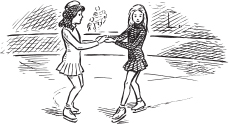
Chapter Three THE RINK
OLIVIA WENT TO the rink with Harriet, for the more Harriet thought about the girl on the poster, standing on one skate with the other foot high over her head, the more sure she was that she would be shy to go alone to a place where people could do things like that. Dr Phillipson was very kind, but he was a busy, rushing, tearing sort of man, who would be almost certain merely to introduce her to the manager by just saying, “This is Harriet,” and then dash off again. This was exactly what happened. Dr Phillipson called for Harriet and her mother just after lunch, took them to the rink, hurried them inside into a small office in which was a tired, busy-looking man, said, “This is Harriet, and her mother. Mrs Johnson, Harriet, this is Mr Matthews, the manager of the rink. I’ve got a patient to see,” and he was gone.
Olivia took no time to make friends with Mr Matthews. She heard all about something called his duodenal ulcer, which was why he knew Dr Phillipson, and all about how Dr Phillipson had taken out his wife’s appendix, and of how Dr Phillipson had looked after his twin boys, who were grown up now and married, and only when there were no more illnesses left in the Matthews’ family to talk about did Olivia mention skating.
“Dr Phillipson tells me you’re going to be very kind and let Harriet come here to skate. He wants her to have exercise for her leg muscles.”
Mr Matthews looked at Harriet’s legs in a worried sort of way.
“Thin, aren’t they? Ever skated before?” Harriet explained she had not. “Soon pick it up, I’ll show you where you go for your skates and boots. Cost two shillings a session they will.” He turned to Olivia. “I’ll have a word with my man who hires them out, ask him to find a pair that fit her; he’ll keep them for her, it’ll make all the difference.”
The way to the skate-hiring place was through the rink. Harriet had never seen a rink before. She gazed with her eyes open very wide at what seemed to her to be an enormous room with ice instead of floor. In the middle of the ice, people, many of whom did not look any older than she was, were doing what seemed to her terribly difficult things with their legs. On the outside of the rink, however, there were a comforting lot of people who seemed to know as little about skating as she did, for they were holding on to the barrier round the side of the rink as if it was their only hope of keeping alive, while their legs did the most curious things in a way which evidently surprised their owners. In spite of holding on to the barrier quite a lot of these skaters fell down and seemed to find it terribly difficult to get up again. Harriet slipped her hand into her mother’s and pulled her down so that she could speak to her quietly without Mr Matthews hearing.


